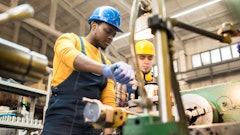
Sustainability is inspiring changes to every aspect of electronics manufacturing, as outlined in a new survey conducted and released by IPC.
“In a time when many industries are considering – or reconsidering – their commitment to sustainability, we wanted to take the pulse of our own industry and understand where companies stand on their sustainability efforts. The overwhelming consensus? Full steam ahead,” says John Mitchell, CEO of IPC. “But one company cannot singlehandedly forge the path forward. Collective action garners greater results. Sustainability efforts can’t achieve their maximum impact if they exist in silos. The survey findings show the electronics industry is in need of alignment, knowledge-sharing, and a collective push to accelerate impact.”
Key takeaways:
- 59% of respondents expect their companies to increase sustainability efforts in 2025. Printed Circuit Board (PCB) and contract manufacturers anticipate the greatest growth.
- Regulatory compliance is a key driver for 66% of respondents, but companies are also motivated by efficiency gains (58%), technological advancements (56%), and long-term competitive positioning (55%). Circular economy and renewable energy seen as top opportunities for growth.
- Budget constraints, regulatory complexity, and limited expertise are the Top 3 primary barriers to sustainability.
- Respondents emphasized need for greater industry-wide interaction, sharing of best practices, and access to resources to navigate sustainability challenges.
- Approximately 72% of survey respondents stated that in their current roles they had some level of influence on sustainability-related decision-making at their companies, approximately 18% were aware of their company’s sustainability efforts but did not contribute directly, and 10% were not involved with sustainability activities at their companies.
- When asked about their company’s approach to sustainability, 82% of respondents indicated organized engagement, including a formal sustainability strategy and dedicated team (36%) and integrating sustainability into some business units (34%). EMS (48%) and OEM (41%) companies were most likely to have dedicated sustainability teams and formal sustainability strategies compared with other sub-industries. Only 3% indicated that their companies did not have a formal sustainability strategy in operation.
- 59% of respondents indicated that their company’s focus on sustainability will increase in 2025. PCB (56%) and contract manufacturers (48%) expect the largest growth in their sustainability efforts, while OEMs (28%) expect lower growth. Only 3% indicated a decrease in their company’s focus and 38% stated they do not expect any change in their company’s focus on sustainability. This shows a growing momentum for sustainability in the industry.
- When given the choice between options, the industry perceived the environment to be more progressive (61%) than regressive (39%), more encouraging (60%) than discouraging (40%), more supportive (57%) than restrictive (43%), and more stable (57%) than volatile (43%). However, the difference in perception was less stark as it related to predictability (53%) and uncertainty (47%). This is likely a reflection of the headwinds facing the industry including budget constraints and the complexity and uncertainty around regulations and compliance.
- One of the lowest ranked drivers was political uncertainty. The survey shows that electronics companies’ sustainability efforts are more influenced by their values, efficiency gains, innovation, and competitive advantage than global politics and the associated uncertainty introduced by shifting politics.






![Pros To Know 2025 [color]](https://img.sdcexec.com/files/base/acbm/scn/image/2025/01/Pros_To_Know_2025__color_.67856cb23da64.png?auto=format%2Ccompress&fit=crop&h=167&q=70&w=250)












